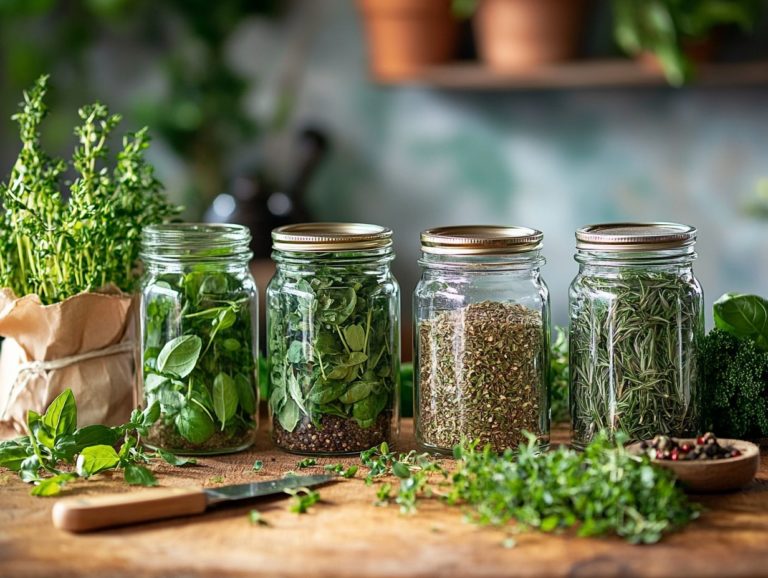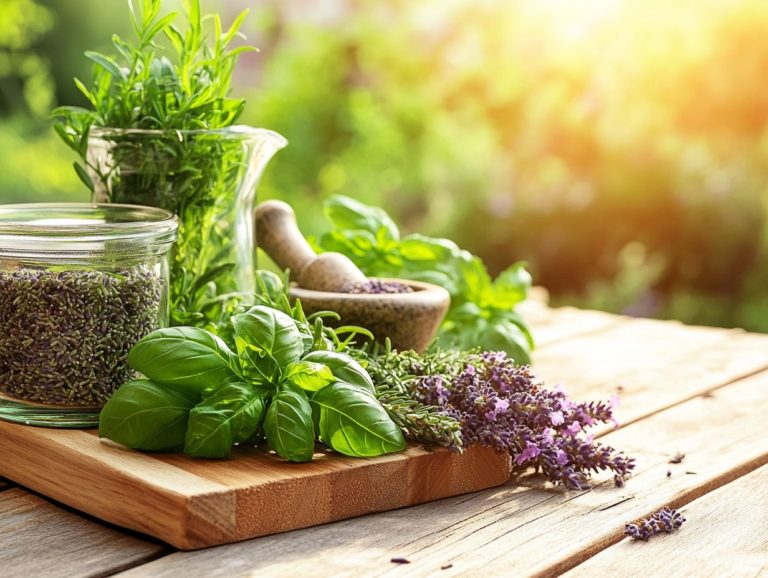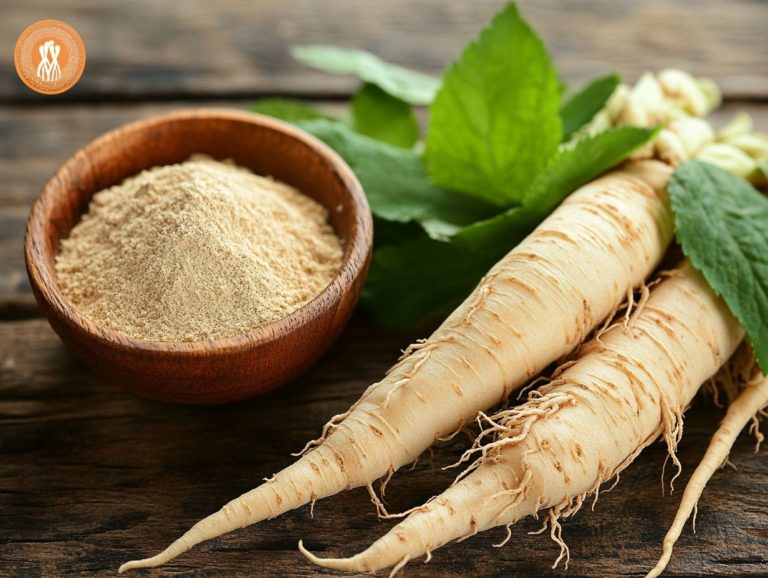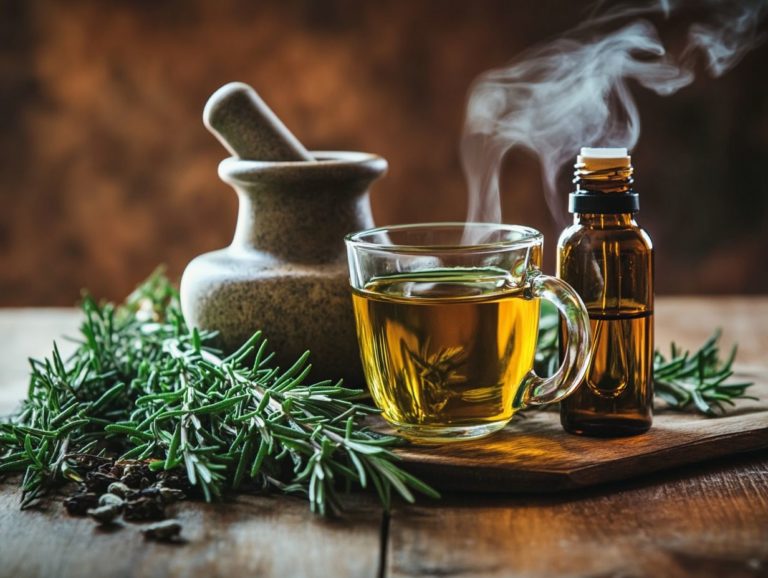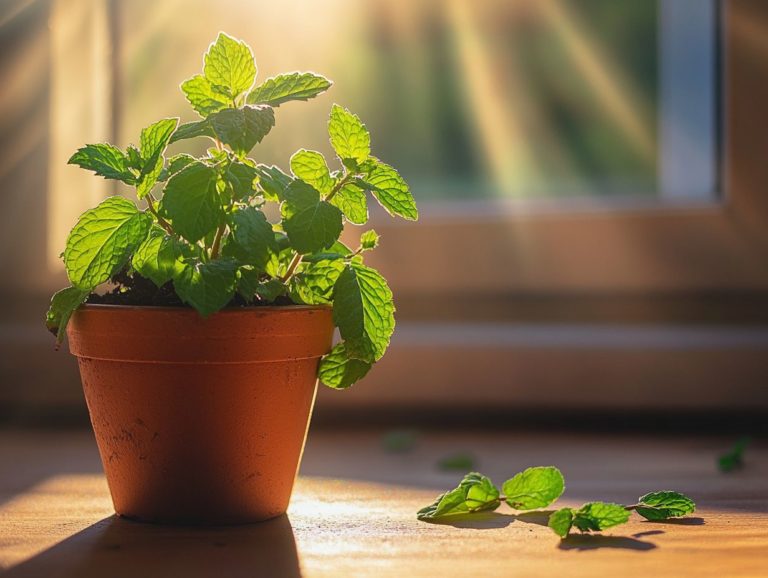How to Use Herbal Remedies Safely
Herbal remedies have long stood as the foundation of traditional medicine, providing a natural and holistic approach to healing that has endured for centuries. Discover the power of herbal remedies today!
These plant-based solutions effectively address a range of health conditions, from calming digestive discomfort to enhancing mental clarity. However, it’s crucial to approach their use with caution, keeping in mind potential interactions and side effects.
Let s explore the myriad benefits of herbal remedies, highlight the safety considerations you should be aware of, and offer guidelines for their selection and preparation. You ll also find a comprehensive overview of popular herbs and their various uses.
Embark on this journey with us as we unveil the world of herbal healing and learn how to harness its power safely and effectively.
Contents
- Key Takeaways:
- Benefits of Using Herbal Remedies
- Safety Considerations for Using Herbal Remedies
- How to Choose and Use Herbal Remedies
- Common Herbal Remedies and Their Uses
- Frequently Asked Questions
- Can herbal remedies be used safely?
- What are some general safety tips for using herbal remedies?
- How can I ensure the quality and safety of herbal remedies?
- What are the potential risks of using herbal remedies?
- How can I educate myself on using herbal remedies safely and effectively?
- How do I know if an herbal remedy is right for me?
Key Takeaways:

- Always consult with a healthcare professional before using herbal remedies to avoid potential interactions and side effects.
- Follow guidelines for selecting and preparing herbs to ensure safe and effective use.
- While herbal remedies have many benefits, remember they are not a substitute for medical treatment and should be used in combination with traditional medicine.
Unlocking the Secrets of Herbal Remedies!
Herbal remedies are natural products derived from plants, thoughtfully crafted to address various health issues by harnessing the natural compounds found in different parts of these plants. For centuries, cultures around the world have relied on these remedies for their medicinal benefits, often viewing them as alternatives or complements to conventional medicines.
While you may be drawn to herbal treatments for their holistic effects, it s essential to grasp the history, efficacy, and safety standards that underpin their use.
Rooted in ancient traditions, herbal remedies emerged from keen observations of nature and the beneficial properties of specific plants. Take garlic, for instance it has long been celebrated for its potential to boost immunity and fight infections. Similarly, ginger is prized for its anti-inflammatory properties and digestive benefits. Echinacea, known for its role in stimulating immune response, illustrates how these natural solutions can cater to various health needs.
Unlike conventional medicines, which often prioritize symptomatic treatment, herbal remedies seek to address underlying imbalances, presenting a more holistic approach that many individuals find appealing as part of their overall wellness strategy.
Benefits of Using Herbal Remedies
Herbal remedies present a wealth of benefits for those exploring alternative or complementary treatment options for various health conditions. These natural solutions are renowned for their capacity to enhance immune system function and contribute to overall well-being.
You ll likely appreciate how they promote a holistic approach to healing, offering not just physical advantages but also psychological support rooted in their traditional use.
Nurturing a Natural and Holistic Approach to Healing
A natural and holistic approach to healing recognizes the significance of treating the whole person rather than merely addressing specific symptoms. This philosophy is at the heart of herbal therapy and herbal remedies. By utilizing natural products derived from plants, you can adopt a more integrative treatment strategy that enhances your overall health and well-being.
When you address not just physical ailments but also the emotional and mental facets of health, herbal therapy encourages a balanced lifestyle. This practice draws from various healing traditions that prioritize wellness through natural ingredients, fostering resilience and vitality in your life.
The holistic benefits of herbal remedies often extend beyond immediate symptom relief, nurturing emotional stability and mental clarity. By carefully selecting herbs tailored to your individual needs, you can tap into profound support for your body s innate healing capabilities.
In this way, natural products become invaluable allies in your quest for holistic health, embracing the interconnectedness of mind, body, and spirit.
Effective for Various Health Conditions

Herbal remedies can be quite effective for a variety of health conditions, serving as both dietary aids and targeted treatments. Whether you re grappling with common issues like digestive disorders or facing more serious health concerns, these herbal formulations can offer valuable support and relief. Seeking guidance from a qualified herbalist practitioner is beneficial.
Take skin issues, for example. If you’re dealing with eczema or psoriasis, Aloe vera might just be the soothing balm you need to alleviate discomfort and promote healing.
On the cognitive area, if you re in search of a little mental boost, Ginkgo biloba is worth considering; it s been studied for its potential to enhance memory and sharpen mental clarity.
It s important to consult professionals before diving into these remedies. They can provide you with insights on appropriate dosages and potential interactions with other medications, ensuring that your chosen remedy aligns with your individual health needs.
Safety Considerations for Using Herbal Remedies
While you may view herbal remedies as safe alternatives to pharmaceutical medications, it’s crucial to consider various safety aspects to sidestep potential issues like adverse reactions or drug interactions. Understanding how to use herbal remedies in holistic nutrition can also enhance your approach to wellness.
Understanding the safety standards and quality control measures tied to herbal products empowers you to make informed decisions about your health.
Possible Interactions and Side Effects
Possible interactions and side effects of herbal remedies can vary greatly, so it s essential to be aware of how these natural products might interact with pharmaceutical medications or worsen serious health conditions.
Adverse reactions can arise, emphasizing the necessity of thorough herbal medicine safety assessments, particularly for sensitive populations such as pregnant women.
Take St. John s Wort, for example. While it’s often used for mood enhancement, it can significantly diminish the effectiveness of antidepressants and birth control pills, potentially leading to unintended pregnancies and unmanaged mental health issues.
Garlic supplements, celebrated for their cardiovascular benefits, can also pose risks; they may increase the chance of bleeding when combined with anticoagulants (medications that prevent blood clots) like warfarin.
These examples underscore the importance of consulting with health experts before incorporating any herbal treatments into your routine. This ensures a comprehensive approach to safety, minimizing the potential for harmful interactions and fostering your overall well-being.
How to Choose and Use Herbal Remedies
Selecting and utilizing herbal remedies demands thoughtful consideration of multiple factors, including the quality of the products, their active ingredients, and the specific health conditions they are intended to address.
Familiarizing yourself with how to choose reputable herbal supplements and ensuring they meet strict quality checks allows you to supercharge the effectiveness of your herbal remedies!
Guidelines for Selecting and Preparing Herbs

When selecting and preparing herbs, it s essential to understand quality standards and the rich history of herbal medicine. This knowledge gives you the power to choose effective and safe herbal preparations.
Consulting with experienced herbalists can offer invaluable insights into best practices for utilizing these natural products effectively.
As you choose your herbs, check for herbal registration and any certifications that indicate quality and safety. These markers will help you gauge the reliability of your source.
Consider various preparation techniques such as drying, infusing, or creating herbal extracts to significantly enhance the potency of the herbs. For example, infusions can capture the rich flavors and benefits, while capsules allow for more convenient and consistent dosages.
Always prioritize safety standards! Ensure the herbs you select have been properly handled and stored. This diligence minimizes any risk of contamination or degradation, allowing you to enjoy the full benefits of your herbal selections.
In conclusion, herbal remedies offer a promising approach to health and wellness. Always consult with professionals and explore these options thoughtfully!
Common Herbal Remedies and Their Uses
Common herbal remedies have long been embraced for their health benefits, with renowned herbs such as Garlic, Turmeric, and Milk Thistle providing distinct health advantages.
These natural products are readily available in health shops and online retailers, allowing you to easily access your preferred herbal extracts and formulations.
Overview of Popular Herbs and Their Benefits
An exploration of popular herbs like Echinacea, Kava, and Ginkgo biloba reveals their distinctive health benefits and diverse medicinal uses, showing how versatile herbal remedies can be in promoting health and wellness. Each of these herbs has historically been employed for specific conditions, contributing to their rising popularity in modern herbal formulations.
Take Echinacea, for example; it s well-known for its immune-boosting properties and has a long-standing reputation for warding off colds and respiratory infections. On the flip side, Kava is known for its calming effects, often used to alleviate anxiety and foster relaxation, making it a go-to for stress management.
Then there s Ginkgo biloba, revered for its extensive history in supporting cognitive function, which refers to skills like memory and focus, particularly when it comes to enhancing memory and concentration.
You can easily add these herbs to your daily routine whether you opt for brewing them in soothing teas, taking concentrated extracts, or tossing them into your morning smoothies. Make sure to consult trusted sources to enjoy all the amazing benefits these herbs have to offer!
Frequently Asked Questions
Can herbal remedies be used safely?

Yes, when used correctly and with proper knowledge, herbal remedies can be used safely and effectively.
What are some general safety tips for using herbal remedies?
Researching your herbs is crucial for safe and effective use! It s important to understand the specific herb and its potential interactions with medications, health conditions, and other herbs. Start with small doses and monitor any reactions. Always consult with a healthcare professional before use, especially if pregnant or breastfeeding.
How can I ensure the quality and safety of herbal remedies?
Look for reputable brands or sources that provide transparent information on the sourcing, processing, and testing of their products. Avoid using herbs from unknown or non-certified sources, as they may contain harmful substances or be contaminated.
What are the potential risks of using herbal remedies?
- Some herbs may cause adverse reactions or interact with medications, especially if used in large doses or with other herbs.
- Risks may arise if the herb is not taken as directed or used in combination with other substances, such as alcohol or caffeine.
How can I educate myself on using herbal remedies safely and effectively?
There are many reputable resources available, such as books, online articles, and certified herbalists. It is important to research and understand the specific herb and its potential risks and benefits before using it.
How do I know if an herbal remedy is right for me?
Consult with a healthcare professional, such as a naturopath or herbalist, to discuss your specific health concerns and goals. They can provide personalized recommendations and guidance on using herbal remedies safely and effectively.
Start your herbal journey today and discover natural ways to enhance your health!

